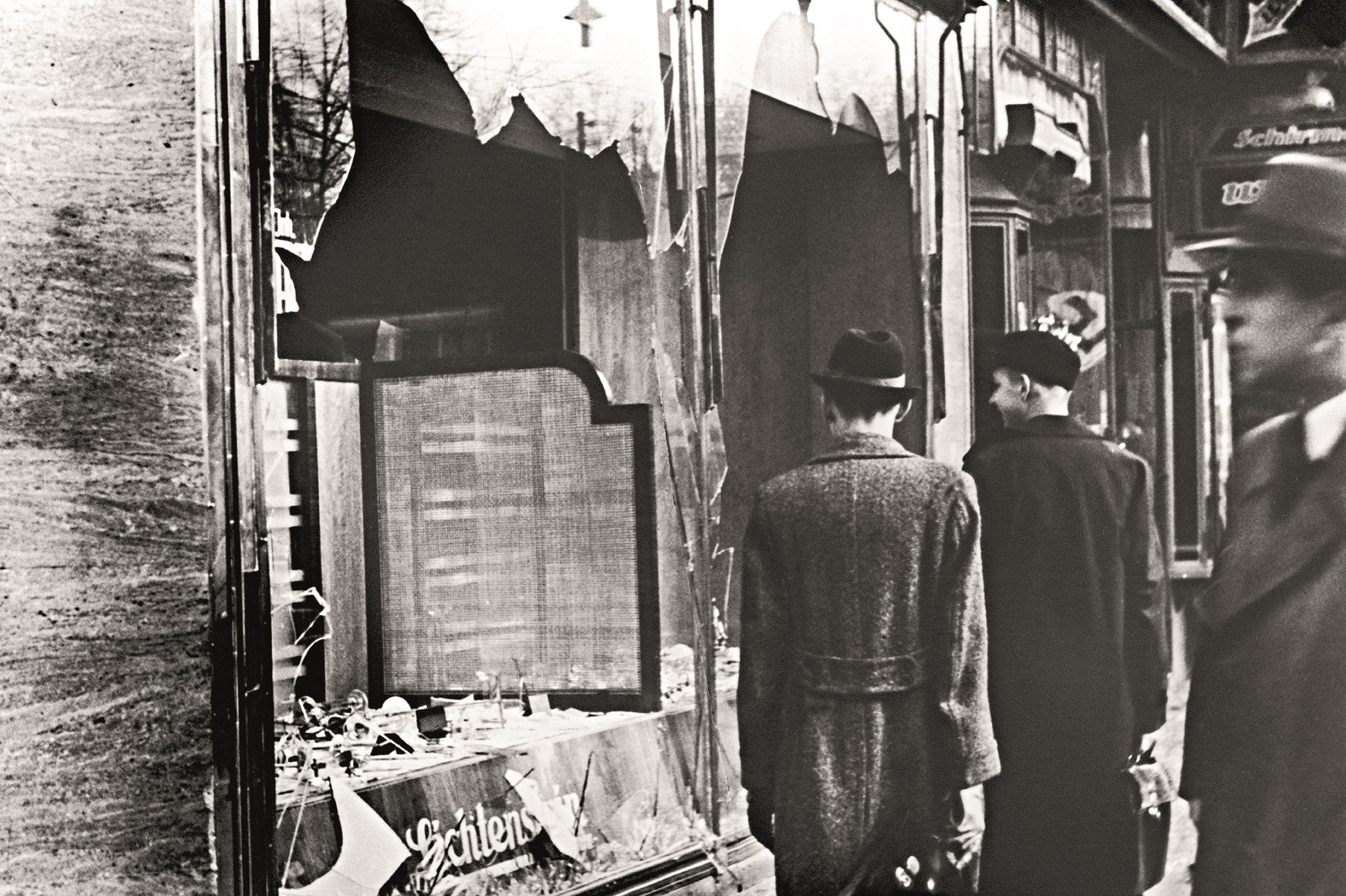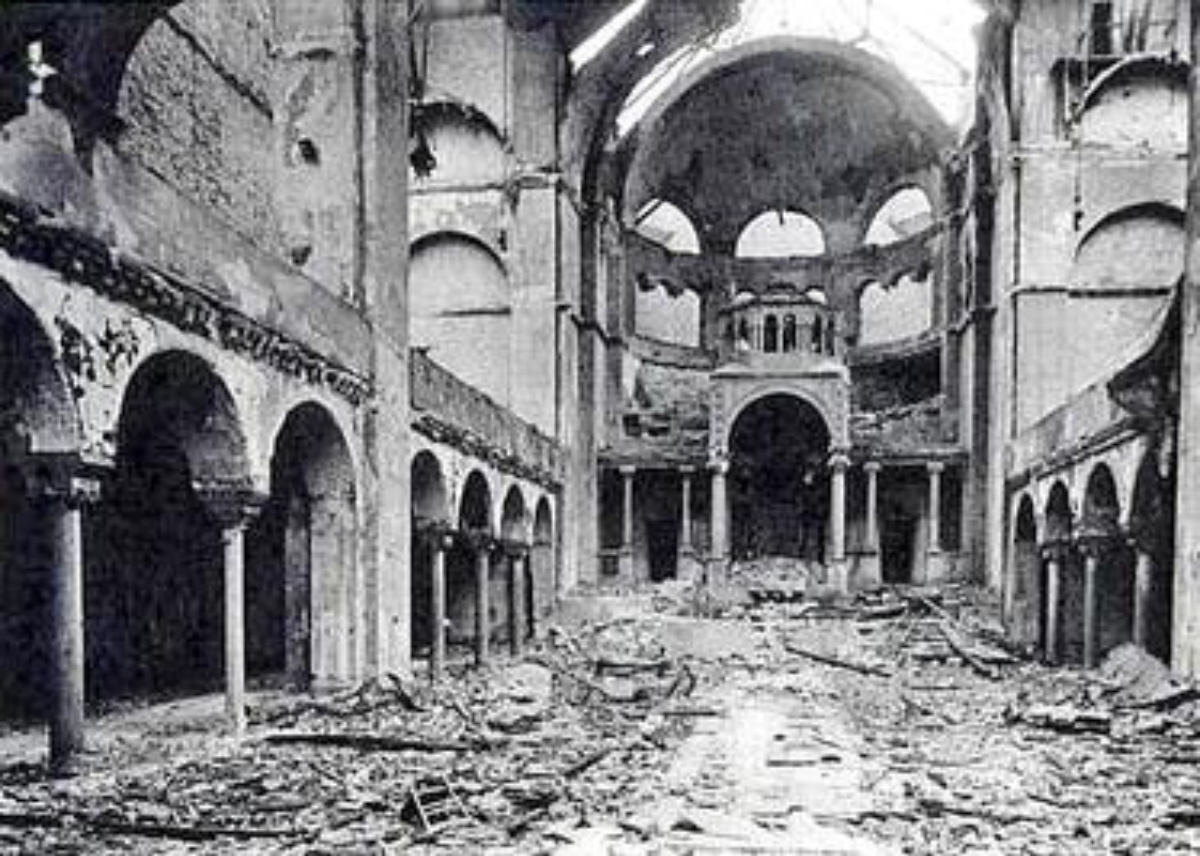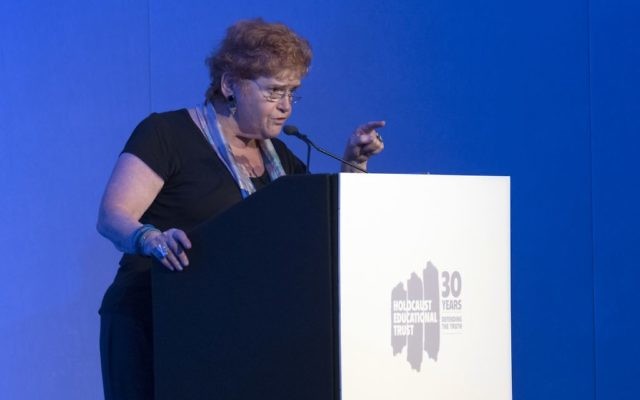OPINION: Deborah Lipstadt – the night Germany relapsed into barbarism
In this forensically detailed analysis, eminent historian Deborah Lipstadt charts the causes and impact of Kristallnacht, precisely 80 years ago
Reichskristallnacht, the “night of broken glass” marked the beginning of the end for the Jews remaining in Nazi Germany.
On November 7, 1938, a young Polish Jew in Paris shot and wounded a German diplomat at the German Embassy. His parents, together with thousands of other Polish Jews who had long been living in Germany, had been expelled to a sort of “no man’s land” between Poland and Germany, as neither country would allow them to cross their borders. Having learned of his parents’s desperate situation, the young man walked up to embassy and shot the diplomat. On November 8ththe diplomat died.
In Germany, there then followed what can only be described as a pogrom. The American consul in Leipzig described the events:
Jewish buildings were smashed, and contents demolished or looted. In one of the Jewish sections an eighteen-year-old boy was hurled from a three-storey window to land with both legs broken on a street littered with burning beds and other household furniture and effects from his family’s and other apartments….Jewish shop windows by the hundreds were systematically and wantonly smashed throughout the entire city…According to reliable testimony, the debacle was executed by SS men and Stormtroopers not in uniform, each group having been provided with hammers, axes, crowbars and incendiary bombs. Three synagogues in Leipzig were fired simultaneously by incendiary bombs and all sacred objects and records desecrated or destroyed, in most cases hurled through the windows and burned in the streets. No attempts whatsoever were made to quench the fires, the activity of the fire brigade being confined to playing water on adjoining buildings….Having demolished dwellings and hurled most of the movable effects onto the streets, the insatiably sadistic perpetrators threw many of the trembling inmates into a small stream that flows through the Zoological Park, commanding horrified spectators to spit at them, defile them with mud and jeer at their plight. The latter incident has been repeatedly corroborated by German witnesses who were nauseated in telling the tale. There is much evidence of physical violence, including several deaths. At least half-a-dozen cases have been personally observed, victims with bloody, badly bruised faces having fled to this office, believing that as refugees their desire to emigrate could be expedited here.

Holocaust deniers face a conundrum. They cannot deny the existence of this pogrom, which was witnessed by hundreds of thousands, including scores of German citizens – many of whom disapproved of it because it was so public and seemed to be out of control – and by foreign reporters and diplomats. Unable to deny it, they take another approach. The claim this was a spontaneous event, an unadulterated expression of the German people’s rage at the Jews, and not something orchestrated by the German government.
They also depict Hitler as, not only bearing no responsibility for what happened, but vigorously opposed to it. According to deniers, among them David Irving, Hitler was “livid” about these outbreaks and issued repeated orders that they were to be stopped.
Historians who have studied the event agree, in contrast to deniers’s claims, that Hitler and the entire Nazi leadership approved of it and that police and members of the SA were given explicit instructions as to how events were to unfold.
When I was sued for libel by Holocaust denier David Irving, our lead historical witness, Professor Richard Evans, presented the court with an array of evidence attesting to the direct participation of the Nazi leadership, from Hitler on down.
In one of those calendrical coincidences November 9thwas the anniversary of the National Socialists’s failed 1923 Munich putsch. The party’s veteran leaders were gathered in Munich to commemorate how far the party had come in the intervening fifteen years.
After having been informed of vom Rath’s death, Hitler came to Old Town Hall, where the dinner was being held. He had a long private conversation with Goebbels and then left without addressing those present. Instead Goebbels spoke to them.
Acknowledging that demonstrations were beginning, he said: “The Führer had decided that such demonstrations were neither to be prepared nor organized by the party, but insofar as they were spontaneous in origin, they should likewise not be quelled.” One can assume that this is what Hitler and Goebbels had privately discussed prior to the German leader’s departure from the dinner. As Goebbels noted in his diary after the evening meeting:
“I brief the Führer on the affair. He orders: let the demonstrations go on. Withdraw the police. The Jews must for once feel the people’s fury. That is right.”
As Professor Richard Evans noted in his report to the court, “all those local party chiefs present understood this to mean that the party organisation should organise anti-Jewish actions without being seen to do so.” Moreover, it is highly doubtful that Goebbels would have described this as a decision by Hitler – “the Fuhrer has decided” – if he had not agreed to it.

Irving did more than just deny Hitler’s involvement. He claimed Hitler was filled with ‘fury” about the pogrom and that, when he learned that synagogue adjacent to his hotel, the Vier Jahreszeiten, was aflame, he was “livid with rage.”Given that he had told Goebbels that the Jews were to be given “a taste of the public anger for a change,” it is hard to believe that now he was livid.
The same official who, according to Irving, found Hitler “livid with rage,” later sent a message that the police were not to halt or interfere in the country wide “actions against the Jews.” Had Hitler indeed been livid, he would not have sent such a message. Goebbels continued to make diary entries throughout the next days.
In Berlin 5, the 15 synagogues burn down. Now the people’s anger rages….Should be given free rein…As I drive to the hotel, windows shatter. Bravo! Bravo! The synagogues burn in all big cities. German property is not endangered.
Had Hitler been filled with “fury,” as Irving claims, would Goebbels have been so pleased with what was happening? Finally, on the following day, Goebbels met with Hitler to discuss ending the pogrom. In his diary he noted:
I report to the Führer…. His views are totally radical and aggressive. The action itself has taken place without any problems. 17 dead. But no German property damaged….The Führer wants to take very sharp measures against the Jews….Then the Führer wants a gradual expropriation of Jewish businesses.
And that is precisely what followed. Jews were fined billions for having “provoked” the event and were stripped of their last remaining freedoms and possessions.
This was the last public display of extreme violence against Jews in Germany. German Jews faced far darker treatment, but it would happen in the “east” in mass shootings and behind the closed doors of gas chambers and gas buses.
Reichskristallnacht was the beginning of the end.

Thank you for helping to make Jewish News the leading source of news and opinion for the UK Jewish community. Today we're asking for your invaluable help to continue putting our community first in everything we do.
For as little as £5 a month you can help sustain the vital work we do in celebrating and standing up for Jewish life in Britain.
Jewish News holds our community together and keeps us connected. Like a synagogue, it’s where people turn to feel part of something bigger. It also proudly shows the rest of Britain the vibrancy and rich culture of modern Jewish life.
You can make a quick and easy one-off or monthly contribution of £5, £10, £20 or any other sum you’re comfortable with.
100% of your donation will help us continue celebrating our community, in all its dynamic diversity...
Engaging
Being a community platform means so much more than producing a newspaper and website. One of our proudest roles is media partnering with our invaluable charities to amplify the outstanding work they do to help us all.
Celebrating
There’s no shortage of oys in the world but Jewish News takes every opportunity to celebrate the joys too, through projects like Night of Heroes, 40 Under 40 and other compelling countdowns that make the community kvell with pride.
Pioneering
In the first collaboration between media outlets from different faiths, Jewish News worked with British Muslim TV and Church Times to produce a list of young activists leading the way on interfaith understanding.
Campaigning
Royal Mail issued a stamp honouring Holocaust hero Sir Nicholas Winton after a Jewish News campaign attracted more than 100,000 backers. Jewish Newsalso produces special editions of the paper highlighting pressing issues including mental health and Holocaust remembrance.
Easy access
In an age when news is readily accessible, Jewish News provides high-quality content free online and offline, removing any financial barriers to connecting people.
Voice of our community to wider society
The Jewish News team regularly appears on TV, radio and on the pages of the national press to comment on stories about the Jewish community. Easy access to the paper on the streets of London also means Jewish News provides an invaluable window into the community for the country at large.
We hope you agree all this is worth preserving.






















